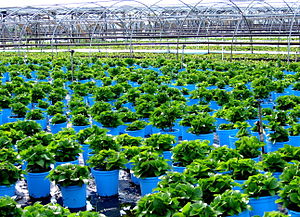 Image via Wikipedia
Image via WikipediaThe plant nursery industry constitutes a large and growing sector of agriculture. In California, where there are more than 3,000 commercial nursery operations, nursery crops constitute a high-value-per-acre commodity, ranking fifth in the state for farm income. Regrettably, pest birds cause a considerable amount of damage to nurseries. Much of this damage occurs when birds eat sown seed or pluck the tops of seedlings after they have emerged but while the endosperm is still attached. This can be a major problem because genetically improved seed is very costly.
Without effective bird control, pest birds such as sparrows, swallows, pigeons and crows can and will invade your nursery. Blackbirds, starlings, and robins will eagerly yank out ripening plants while they dig for bugs. Prompted by good weather and the absence of adequate nearby food supplies, pest birds will eagerly dive into your nursery and aggressively attack a particular plant they like.
Before resorting to lethal bird control measures, nursery managers should be aware that many birds regarded as pests are classified as migratory and are protected by federal and state laws. Some humane and effective bird control measures are described below. Ideally, the best strategy is to use several measures simultaneously to ensure pest birds stay out of your nursery. And be proactive. Install these bird control measures before birds establish regular feeding patterns in your nursery.

